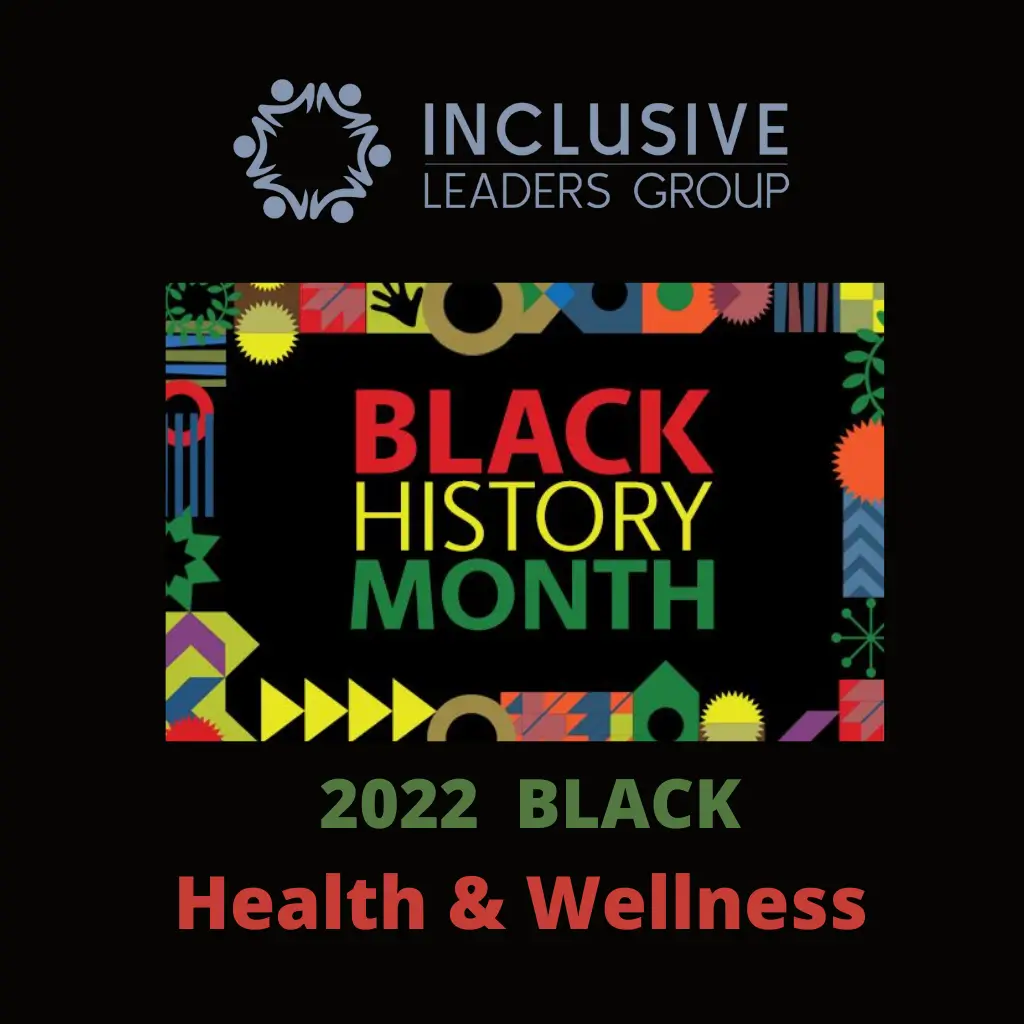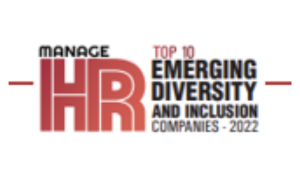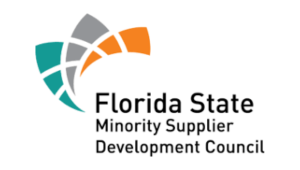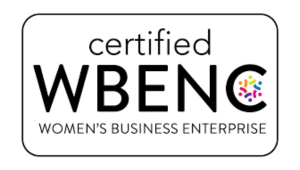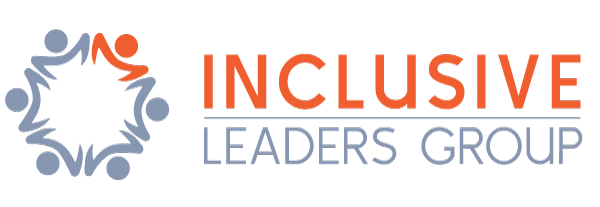As you know, the 2022 Black History Month’s theme is Black Health and Wellness. This focus celebrates the contributions and breakthroughs of Black professionals as well as speaking to the cultural richness of those “non-traditional” health and wellness practitioners.
According to the U.S. Centers for Disease Control and Prevention (CDC), health equity is achieved when every person has the opportunity to “attain his or her full health potential” and no one is “disadvantaged from achieving this potential because of social position or other socially determined circumstances.” The CDC says health inequities are reflected in differences in longevity; quality of life; rates of disease, disability and death; severity of disease; and access to treatment.
For the past two years the national reckoning on racial injustice in the United States in 2020 and the COVID-19 pandemic throughout 2021 drew attention to many disparities among Americans, including access to healthcare and outcomes in health. Those gaps continue to exist including for individuals who work for medium and large US employers. As a result, several client partners have sought help from Inclusive Leaders Group to ensure that their workplace wellness programs are welcoming to all employees, especially Black and Indigenous and People of Color (BIPOC) employees.
The Role of Mental Health for a Diverse and Inclusive Workplace
When we talk about ‘diversity’, we tend to think of legally protected characteristics like race and gender, categories of people that are important in fighting against unfair discrimination. So, it may seem strange to include mental health among them because beneath those differences we all have mental health in common. But I think there is also a place for mental health in the conversation about diversity and inclusion, especially because each of those characteristics can interact with – and even affect – our mental health. The American Society for Healthcare Human Resources Administration (ASHHRA), a division of the American Hospital Association, is the nation’s only membership organization dedicated to meeting the needs of human resources professionals in healthcare. I am proud to have been selected for the ASHHRA Education Committee and have authored an article on The Role of Mental Health for a Diverse and Inclusive Workplace.
My team and I have developed workshops and perform speaking engagements tailored to address specific challenges employers are facing regarding mental health including:
- Mental Health as a Workplace DEI Matter: 90% of employees are impacted by mental health, whether themselves or others close to them. It impacts every company, department, and team . Companies that want to create connected and inclusive workplaces need to address mental health head-on. How can leaders create a stigma-free culture that is supportive of mental health, while also complying with regulations? Employers are faced the prevalence of mental health challenges at work, the need to address stigma, and the emerging link to diversity, equity, and inclusion (DEI). Inclusive Leaders Group’s tailored workshops aim to reduce the stigma around discussing employee mental health conditions. The pandemic has created an unexpected opportunity for more open and supportive conversations between HR, employees and senior leadership.
- Prioritizing Mental Health and Well-Being for Women@Work: Women have always faced unique challenges in the workplace. Recently, societal and environmental factors have increased the burden of stress on women in every age group, life situation and economic bracket. This has led to many women experiencing huge amounts of stress, and change is needed. Employers have the opportunity to take a leading role in preventing and addressing burnout, as they witness first-hand how women balance multiple priorities — and often struggle. By putting additional emphasis on mental health and wellness, employers can help their employees see that these struggles are normal and not a source of shame. This can also help create space to provide guidance and support, enabling employees to access the help they need.
Johnson & Johnson and Mental Health as a Diversity and Inclusion Matter
At Johnson & Johnson, the company believes in looking at health holistically: physical, mental and emotional health are inexorably linked. “Mental well-being is not a ‘nice-to-have,’ but a ‘must-have.’ And we all need to take care of our mental health the same way we take care of our physical health.— Jennifer Bruno, Vice President of Global Health Services, Johnson & Johnson.
An innovative initiative is One Mind at Work, a coalition Johnson & Johnson helped create and fund, explains Craig Kramer, Mental Health Ambassador and Chair, Johnson & Johnson’s Global Campaign on Mental Health. The coalition brings together business leaders from around the world to help transform approaches to mental health and addiction, which includes developing and implementing a gold standard for workplace mental health and well-being.
In April 2017, the Mental Health Diplomats employee resource group was formed. This group of 600+ passionate employees in 21 countries worldwide have a common interest in raising awareness of mental health in the workplace, providing resources to educate and support employees coping with mental illness and ultimately fostering a culture of inclusion at J&J by helping to remove the stigma often associated with mental health. Recently, this group mobilized 80+ global J&J sites to share their resources on World Mental Health Day. Sites across the globe held interactive activities, speaker forums, and lunch & learns, while also promoting via posters, videos, and through our internal social newsfeed.
For additional insights, listen to Inclusive Leaders Group Chief Strategy Officer Brian Hughes’ conversation with Craig Kramer, Mental Health Ambassador and Chair, Johnson & Johnson’s Global Campaign on Mental Health. In this episode of Inclusive Leaders Group’ The Inclusive Enterprise Podcast, Craig Kramer describes Johnson & Johnson’s history, strategy, and the incredible success the organization has had in addressing Mental Health as a Diversity and Inclusion matter.
Workplace Wellness Programs Have Overlooked Health Equity
- Working toward health equity is the right thing to do for all organizations. Research from the American Heart Association and The Georgetown University Center for Children and Families (CCF) shows that promoting health equity can benefit employee health and productivity, and reduce health care costs. The health of the entire nation will improve if employers commit to actions that eliminate inequities – benefitting employees, their families and their communities.
- The 2021 Workplace Wellness Survey (WWS) included an oversample of Black and Hispanic workers in order to better understand the unique workplace wellness needs of such workers and to explore and identify potential differences in attitudes, experiences, and behaviors related to workplace wellness. Given economic differences in these segments of workers, this paper takes a closer look at the combination of race/ethnicity and income. The EBRI and Greenwald 2021 Workplace Wellness Survey (WWS) was sponsored by: AARP, Cigna, Fidelity, Lincoln Financial, Mercer, Morgan Stanley, National Rural Electric Cooperative Association (NRECA), Voya Financial, Unum, and Wells Fargo.
- A recent survey of large US employers by McKinsey & Company found women of color and LGBTQ+ employees have the highest share of unmet basic needs. Employers are encouraged in the report to expand the range of benefits offered to be inclusive of employees of color.
I outline some ways to make Workplace Wellness More Inclusive To Reduce Health Disparities in my blog post and with Inclusive Leaders Group Senior Consultant Ebony Shumake Berry have co-developed the Inclusive Workplace Wellness to Improve Health Equity Webinar that provides a preview of our workplace wellness inclusion assessment, education & training, and keynotes. The Webinar is in partnership with The First Coast Worksite Wellness Council, Inc. The mission of the Council is to improve the health of the Northeast Florida community by sharing resources and providing guidance through their member businesses.
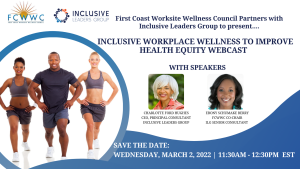
Address The Urgency of Workplace Mental Health and Inclusive Workplace Wellness to Improve Health Equity
Health equity in the workplace means that all employees have a fair and just opportunity to be as healthy as possible. Employers have long offered employer-sponsored health insurance, but now many are asking what more they can do to help minority and LGBTQ+ employees engage with workplace wellbeing programs. Contact me to schedule a needs assessment conversation at charlotte@inclusiveleadersgroup.com or use my contact form.

As CEO and Principal Consultant of Inclusive Leaders Group, LLC, Charlotte Hughes MS, CDP, SHRBP, CPLP brings a diverse background as an accomplished Workforce and Organizational Development and Diversity & Inclusion global thought leader and practitioner for several major Fortune 100 companies and one of the largest health systems in the U.S. Charlotte delivers more than 60 speeches and facilitates roughly the same number of training workshops each year.

